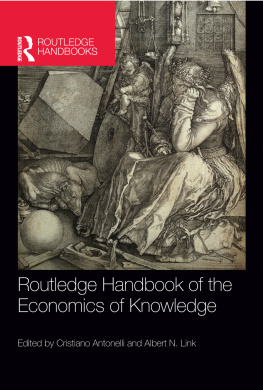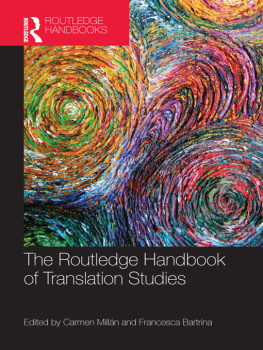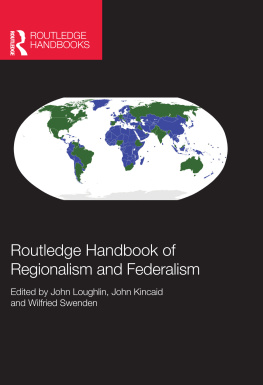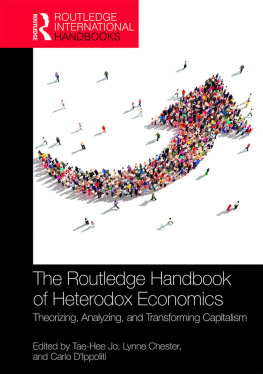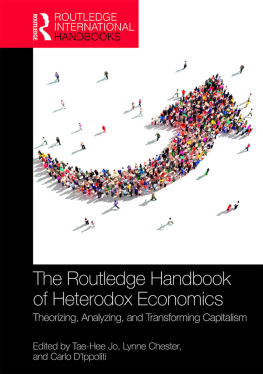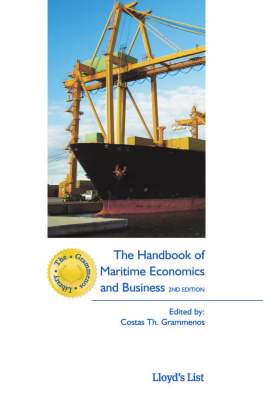Antonelli Cristiano - Routledge Handbook of the Economics of Knowledge
Here you can read online Antonelli Cristiano - Routledge Handbook of the Economics of Knowledge full text of the book (entire story) in english for free. Download pdf and epub, get meaning, cover and reviews about this ebook. City: London;New York, year: 2015, publisher: Routledge, Taylor & Francis Group, genre: Romance novel. Description of the work, (preface) as well as reviews are available. Best literature library LitArk.com created for fans of good reading and offers a wide selection of genres:
Romance novel
Science fiction
Adventure
Detective
Science
History
Home and family
Prose
Art
Politics
Computer
Non-fiction
Religion
Business
Children
Humor
Choose a favorite category and find really read worthwhile books. Enjoy immersion in the world of imagination, feel the emotions of the characters or learn something new for yourself, make an fascinating discovery.
- Book:Routledge Handbook of the Economics of Knowledge
- Author:
- Publisher:Routledge, Taylor & Francis Group
- Genre:
- Year:2015
- City:London;New York
- Rating:3 / 5
- Favourites:Add to favourites
- Your mark:
- 60
- 1
- 2
- 3
- 4
- 5
Routledge Handbook of the Economics of Knowledge: summary, description and annotation
We offer to read an annotation, description, summary or preface (depends on what the author of the book "Routledge Handbook of the Economics of Knowledge" wrote himself). If you haven't found the necessary information about the book — write in the comments, we will try to find it.
Routledge Handbook of the Economics of Knowledge — read online for free the complete book (whole text) full work
Below is the text of the book, divided by pages. System saving the place of the last page read, allows you to conveniently read the book "Routledge Handbook of the Economics of Knowledge" online for free, without having to search again every time where you left off. Put a bookmark, and you can go to the page where you finished reading at any time.
Font size:
Interval:
Bookmark:

Routledge Handbook of the Economics of Knowledge
The Routledge Handbook of the Economics of Knowledge provides a comprehensive framework to integrate the advancements over the last 20 years in the analysis of technological knowledge as an economic good, and in the static and dynamic characteristics of its generation process.
There is a growing consensus in the field of economics that knowledge, technological knowledge in particular, is one of the most relevant resources of wealth, yet it is one of the most difficult and complex activities to understand or even to conceptualize. The economics of knowledge is an emerging field that explores the generation, exploitation, and dissemination of technological knowledge. Technological knowledge can no longer be regarded as a homogenous good that stems from standardized generation processes. Quite the opposite, technological knowledge appears more and more to be a basket of heterogeneous items, resources, and even experiences. All of these sources, which are both internal and external to the firm, are complementary, as is the interplay between bottom-up and top-down generation processes. In this context, the interactions between the public research system, private research laboratories, and various networks of learning processes, within and among firms, play a major role in the creation of technological knowledge.
In this Handbook special attention is given to the relationship between technological knowledge and both upstream scientific knowledge and related downstream resources. By addressing the antecedents and consequences of technological knowledge from both an upstream and downstream perspective, this Handbook will become an indispensable tool for scholars and practitioners aiming to master the generation and the use of technological knowledge.
Cristiano Antonelli is Professor of Economics at the University of Torino where he is the President of the School of Economics and Statistics and a Fellow of the Collegio Carlo Alberto, Italy.
Albert N. Link is Professor of Economics at the University of North Carolina at Greensboro, USA.
Routledge Handbook of the Economics of Knowledge
Edited by Cristiano Antonelli and Albert N. Link

First published 2015
by Routledge
2 Park Square, Milton Park, Abingdon, Oxon OX14 4RN
and by Routledge
711 Third Avenue, New York, NY 10017
Routledge is an imprint of the Taylor & Francis Group, an informa business
2015 selection and editorial material, Cristiano Antonelli and Albert N. Link; individual chapters, the contributors
The right of the editors to be identified as the authors of the editorial material, and of the authors for their individual chapters, has been asserted in accordance with sections 77 and 78 of the Copyright, Designs and Patents Act 1988.
All rights reserved. No part of this book may be reprinted or reproduced or utilized in any form or by any electronic, mechanical, or other means, now known or hereafter invented, including photocopying and recording, or in any information storage or retrieval system, without permission in writing from the publishers.
Trademark notice: Product or corporate names may be trademarks or registered trademarks, and are used only for identification and explanation without intent to infringe.
British Library Cataloguing in Publication Data
A catalogue record for this book is available from the British Library
Library of Congress Cataloging-in-Publication Data
Antonelli, Cristiano.
Routledge handbook of the economics of knowledge / Cristiano Antonelli, Albert N. Link. First Edition.
pages cm
Includes bibliographical references and index.
1. Knowledge managementEconomic aspects. 2. Information technologyEconomic aspects. 3. Technological innovationsEconomic aspects. I. Link, Albert N. II. Title.
HD30.2.A5793 2014
658.4038dc23
2014018440
ISBN: 978-0-415-64099-2 (hbk)
ISBN: 978-0-203-08232-4 (ebk)
Typeset in Bembo
by Cenveo Publisher Services
Contents
Albert N. Link
Benot Godin
David B. Audretsch, Erik E. Lehmann, and Joshua Hinger
Brje Johansson and Hans Lf
Mge zman
Rajeev K. Goel, Devrim Gktepe-Hultn, and Rati Ram
Phil Cooke
Francesco Crespi and Giuseppe Scellato
Christopher S. Hayter
Heather Rimes, Jennie Welch, and Barry Bozeman
Fabio Montobbio and Rodrigo Kataishi
Gregory Tassey
Cristiano Antonelli
Cristiano Antonelli
Contributors
Cristiano Antonelli, University of Torino and Collegio Carlo Alberto, Italy.
David B. Audretsch, Indiana University, USA.
Barry Bozeman, Arizona State University, USA.
Phil Cooke, University of Cardiff, Wales.
Francesco Crespi, University of Rome III and Collegio Carlo Alberto, Italy.
Benot Godin, INRS (Montral), Canada.
Rajeev K. Goel, Illinois State University, USA.
Devrim Gktepe-Hultn, Lund University, Sweden.
Christopher S. Hayter, Arizona State University, USA.
Joshua Hinger, Indiana University, USA.
Brje Johansson, Jnkping International Business School, Jnkping, Sweden.
Rodrigo Kataishi, University of Torino, Italy.
Erik E. Lehmann, University of Augsburg, Germany.
Albert N. Link, University of North Carolina at Greensboro, USA.
Hans Lf, Royal Institute of Stockholm, Sweden.
Fabio Montobbio, University of Torino, Italy.
Mge zman, Telecom Ecole de Management, France.
Rati Ram, Illinois State University, USA.
Heather Rimes, University of Georgia, USA.
Giuseppe Scellato, Politecnico di Torino and Collegio Carlo Alberto, Italy.
Gregory Tassey, University of Washington, USA.
Jennie Welch, University of Georgia, USA.
Albert N. Link
Since we know little about the causes of productivity increase, the indicated importance of this element may be taken to be some sort of measure of our ignorance about the causes of economic growth in the United States and some sort of indication of where we need to concentrate our attention.
Moses Abramovitz (1956, p. 11)
The Abramovitz (1956) paper, from which the above epigram came, and the seminal work by Solow (1957) are heralded by many as foundational reading for what Antonelli and Link (2014) have referred to as the area of investigation known as the economics of technological change. Antonelli and Link (2014, p. xiii) write:
The analysis of the causes and consequences of the increase of the general efficiency of labor and the associated changes in production, consumption, and distribution brought about by the introduction of new technologies in economic systems is a field of economic investigation of growing interest and widening activity both in research and teaching. This field has evolved over time, partly in response to the changing focus of economic analysis. This area of investigation was identified as the economics of technical progress for a large part of the 20th century. In the 1960s and 1970s, it was referred to as the economics of technological change, and through the 1980s and 1990s it became known as the economics of innovation. Since then a new shift occurred to bring to the attention of scholars the economics of knowledge as a crucial crossing between the economics of science and the innovation. The discovery of the so-called residual, along with an appreciation of its size, pushed economics to investigate more deeply the characteristics of the new technologies in terms of factor intensity, elasticity of substitution, output elasticity, and technology diffusion. This phase of academic understanding coincides with the economics of technological change.
Next pageFont size:
Interval:
Bookmark:
Similar books «Routledge Handbook of the Economics of Knowledge»
Look at similar books to Routledge Handbook of the Economics of Knowledge. We have selected literature similar in name and meaning in the hope of providing readers with more options to find new, interesting, not yet read works.
Discussion, reviews of the book Routledge Handbook of the Economics of Knowledge and just readers' own opinions. Leave your comments, write what you think about the work, its meaning or the main characters. Specify what exactly you liked and what you didn't like, and why you think so.

